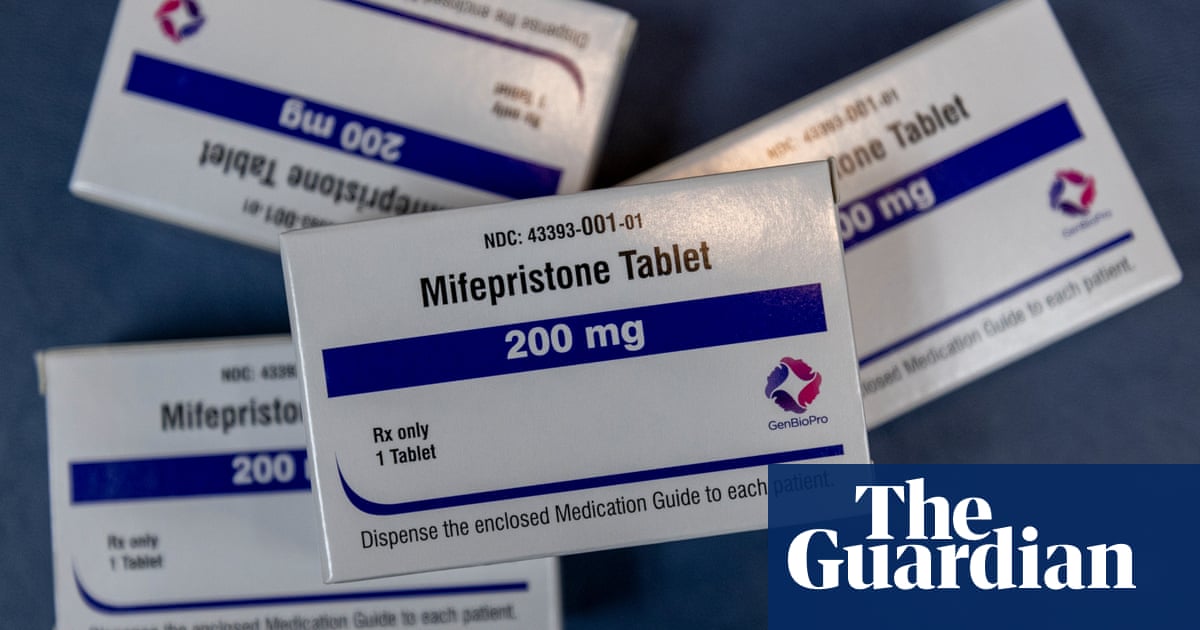TheTrump administrationon Monday asked a federal court todismiss a lawsuitthat takes aim at the abortion pill mifepristone – a move that stunned many observers for what seemed a defense of the drug by a president who has overseen the most dramatic rollback of abortion rights in modern US history.
At first blush, it may seem a victory for abortion access – but experts worry that, in reality, the move preserves the administration’s ability to play coy about any future plans to attackabortionrights.
WhenDonald Trumpfirst returned to the White House earlier this year, US anti-abortion activists had high hopes for the man who helped orchestrate the downfall ofRoe v Wade. They thought he might use a19th-century anti-vice lawto effectively ban abortion nationwide. Failing that, they imagined that he might use the power of the Food and Drug Administration to roll back access to mifepristone or even yank it from the market entirely.
Instead, over the last few months, theTrump administrationhas attempted to dodge the issue entirely. The Monday request, to a Texas judge who has become a reliable vote for abortion opponents, continued that pattern.
The lawsuit seeks to roll back several FDAregulatory changes that have, over the last decade, considerably expanded access to mifepristone, one of two drugs typically used in US medication abortions. It revives a lawsuit that led to a stinging9-0 defeatfor abortion rights opponents when the court ruled the lawsuit’s plaintiffs, a group of anti-abortion doctors, did not have the legal standing to sue in the first place.
Rather than let the matter die, the Republican attorneys general of Idaho, Kansas and Missouri moved to take over the case as its new plaintiffs. Judge Matthew Kacsmaryk of the US district court for the northern district of Texas, where the case is being heard, agreed to let the attorneys general move forward.
However, in its Monday filing, the Trump administration argued that there is no reason why the case should proceed in Texas.
“At bottom, the states cannot keep alive a lawsuit in which the original plaintiffs were held to lack standing, those plaintiffs have now voluntarily dismissed their claims, and the states’ own claims have no connection to this district,” the administration wrote.
Abortion rights supporters have long pointed to one reason why the case was filed in Texas: Kacsmaryk. A Trump appointee with a track record of abortion opposition, Kacsmaryk once took the unprecedented step of ruling to reverse the FDA’s 2000 approval of mifepristone, which would lead to its removal from the market.
Nicole Huberfeld, a health law professor at Boston University’s School of PublicHealth, found it “a little funny” that the Trump administration’s filing seemed to call out its own side for judge-shopping.
It is possible that Trump, who was never exactly a true believer in the anti-abortion movement, has now soured on it. While the movement helped propel him to the White House in 2016, it became something of an albatross for him in 2024, as outrage over Roe’s collapse led abortion rights to become one of the election’s top issues.
YetHuberfeld found the filing more notable for what it did not say: namely, it shied away from revealing the Trump administration’s plans for mifepristone. She believes the administration may try to change mifepristone access through the FDA, and that the legal reasoning in Monday’s filing could be used against a future lawsuit by blue states against new restrictions.
“They’re basically saying that the states don’t get to just challenge FDA policy because they want to,” Huberfeld said. “Which, in my view, is a set-up for anticipating that blue states may try to challenge any changes on mifepristone rules.”
FDA Commissioner Martin Makary could, for example, move to reverse regulations that permit people to dispense abortion pills through telehealth – which accounts for about a fifth of all US abortions – or eliminate mifepristone’s approval. Project 2025, the notorious playbook of policy proposals authored by the conservative thinktank the Heritage Foundation,urged the FDAto do exactly that.
Last month, Makarytold the Semafor World Economy Summitthat he had “no plans to take action” on mifepristone. However, he added: “There is an ongoing set of data that is coming into the FDA on mifepristone. So if the data suggests something or tells us that there’s a real signal, we can’t promise we’re not going to act on that data.”
Decades of studies, conducted in more than a dozen countries, have found thatmifepristone is safe and effective. However, anti-abortion groups have repeatedly pushed studies that claimed to find that mifepristone is dangerous. (Some of thosestudies have been retracted.)
“My guess is that the Trump administration is trying to walk the fine line of not looking like it’s threatening access to mifepristone while also, potentially, through the FDA trying to limit access to mifepristone,” Huberfeld said. “In other words, I don’t think the FDA’s actually going to be hands-off.”
